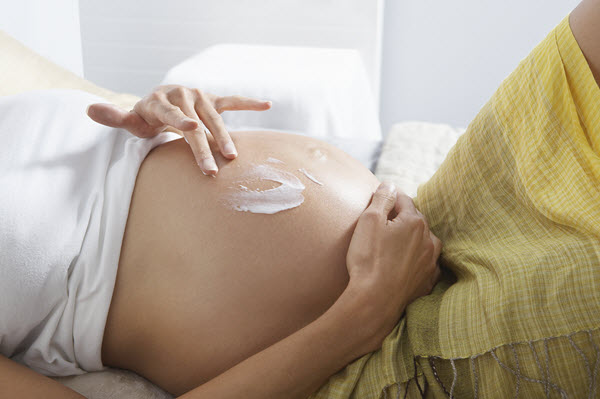You are waiting for what is going to be the most memorable moment in your life- giving birth to your first baby. It’s an incredibly beautiful experience but one that also causes a lot of changes. And while some of these changes are easy to deal with, getting acne during pregnancy is a totally different story. It’s pretty common, too. In fact, one in every two women is likely to develop pimples during pregnancy. If you are currently stressed out with pregnancy acne, here are the best solutions to get rid of those zits.
What Causes Acne During Pregnancy?
Getting pimples when you’re pregnant could be a result of many factors. The list includes:
Increased androgen level
Hormones, hormones, and more hormones! As is the case with most changes that occur during pregnancy, acne is caused by changes in your hormones. A rise in your body’s androgen level, for example, can trigger your sebaceous glands to produce more oil. When that oil combines with dead skin cells, you can end up with clogged pores. This can lead to inflammation and acne.
Dietary Changes
 A lot of pregnant women experience extreme hunger pangs. These hunger pangs strike at odd hours and this can cause you to grab the nearest snack you can find. This can spell bad news for your skin. Junk foods, sweets, and foods with a high glycemic index can have a negative effect on your body. They can cause an imbalance in your hormones, which can trigger more sebum production.
A lot of pregnant women experience extreme hunger pangs. These hunger pangs strike at odd hours and this can cause you to grab the nearest snack you can find. This can spell bad news for your skin. Junk foods, sweets, and foods with a high glycemic index can have a negative effect on your body. They can cause an imbalance in your hormones, which can trigger more sebum production.
See Also: What to Eat During Pregnancy
Genetic Tendency
People who’ve had acne before are likely to experience more pimples when they become pregnant. If you’re genetically predisposed to pimples, there’s not much you can do to prevent them.
How to Treat Pregnancy Acne
Wash your face
The best way to prevent acne is to take care of your skin. Make sure that there’s no dirt, makeup residues, and dead skin cells that can clog your pores. Wash your face gently twice a day. For the best results, you should only use mild cleansers. Be sure to clean thoroughly, particularly the areas near your hairline and jaw as they are the most prone to acne. You should also consider washing your hair on a regular basis. Moreover, keep your pillowcases and towels clean.
Do not scrub hard
Avoid scrubbing your skin too hard. This can only make things worse as it can strip off your skin’s natural moisture. During pregnancy, your skin is extra sensitive, too. Make sure to treat it more delicately. Picking or trying to squeeze your skin pores is not advisable, either. It will only leave you with scars.
Moisturize
 Use an oil-free moisturizer to hydrate your skin without having to worry about getting clogged pores. Keeping your skin moisturized is essential as an excessively dry skin is more susceptible to acne breakouts.
Use an oil-free moisturizer to hydrate your skin without having to worry about getting clogged pores. Keeping your skin moisturized is essential as an excessively dry skin is more susceptible to acne breakouts.
Be sun-savvy
Conventional acne medications can make your skin vulnerable to sun damage. Excessive sun exposure can increase your risk of getting skin cancer and premature skin aging, too. If you know you’ll be outside for an extended period, wear a sunscreen with SPF 30 or higher.
Eat more foods rich in vitamin A
These include milk, eggs, fish, and carrots. However, you should be careful not to go overboard with vitamin A intake. Experts recommend avoiding vitamin A supplements as they are linked to certain birth defects. As such, you should focus on getting vitamin A the natural way and that is through your diet.
Try coconut oil
Another home remedy you should try is coconut oil. It’s loaded with medium-chain fatty acids that are great in fighting the underlying cause of acne. More specifically, coconut oil has lauric acid and caprylic acid, both of which get metabolized into antifungal and antibacterial agents.
Acne Treatments You Should Avoid
One of the medications that revolutionized acne treatment is Isotretinoin. However, because it may cause birth defects, it is not advisable for pregnant women to take this drug. Due to its side effects, doctors, pharmacists, and wholesalers who deal with Isotretinoin are required to join a special program concerned with preventing pregnancy and birth defects. There are other prescription acne drugs which can lead to birth defects. They are:
- Hormone therapy, including estrogen, flutamide, and spironolactone.
- Topical retinoids, like adapalene, tretinoin, and tazarotene. Based on research studies, the amounts absorbed from these medications is low. Nonetheless, there’s a concern they also increase the risk of birth defects.
- Oral tetracycline, such as minocycline, doxycycline, and tetracycline. Taking these medications can inhibit bone growth and discolor your teeth permanently.
See Also: Cure Your Skin Today: The Best Adult Acne Home Remedies
Conclusion
It is not unusual to get acne when you’re pregnant. Thankfully, there are certain things you can do to treat pregnancy acne. By keeping your skin moisturized and clean, increasing your intake of vitamin A, and using skincare products containing coconut oil, you’ll be able to keep your skin free from zits.
The post Acne During Pregnancy: What Is The Best Treatment? appeared first on Dumb Little Man.
from
https://www.dumblittleman.com/acne-during-pregnancy/

No comments:
Post a Comment